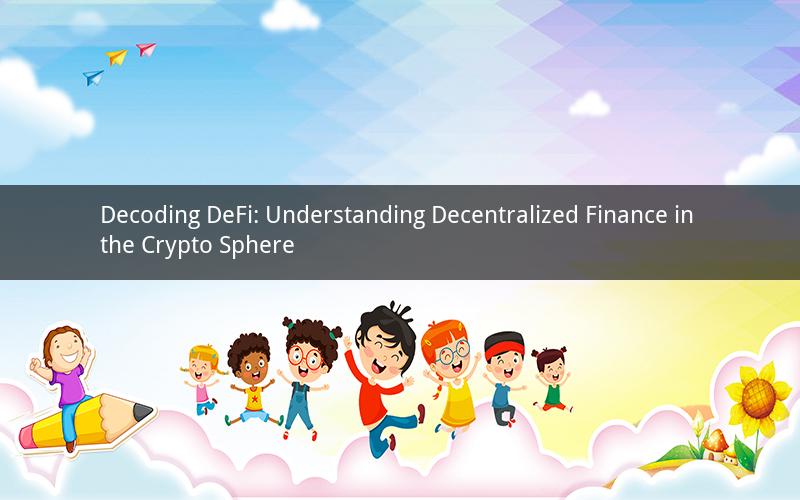
In the rapidly evolving world of cryptocurrencies, a term that has gained significant traction is DeFi, which stands for decentralized finance. But what exactly is DeFi, and how does it shape the crypto landscape? This article delves into the intricacies of DeFi, its benefits, challenges, and its impact on the future of finance.
What is DeFi?
DeFi, or decentralized finance, refers to a growing ecosystem of financial applications built on blockchain technology. It aims to replicate traditional financial services, such as lending, borrowing, and trading, but without the need for intermediaries like banks or brokers. Instead, DeFi leverages smart contracts, which are self-executing contracts with the terms of the agreement directly written into code.
The core principle of DeFi is to democratize finance by making it accessible to anyone with an internet connection and a digital wallet. By eliminating intermediaries, DeFi can offer lower fees, faster transactions, and greater transparency compared to traditional financial systems.
How Does DeFi Work?
DeFi operates through decentralized applications (dApps) that run on blockchain networks, primarily Ethereum. These dApps utilize smart contracts to facilitate transactions and interactions between users. Here's a breakdown of the key components:
1. Smart Contracts: These are self-executing contracts with the terms of the agreement directly written into code. They automate the execution of transactions, ensuring that all parties involved adhere to the agreed-upon conditions.
2. Decentralized Exchanges (DEXs): DEXs enable users to trade cryptocurrencies directly with each other without the need for a centralized exchange. They use order books and liquidity pools to facilitate trades.
3. Lending and Borrowing Platforms: DeFi platforms allow users to lend or borrow cryptocurrencies. Lenders earn interest on their deposits, while borrowers can access capital without going through traditional financial institutions.
4. Yield Farming: This is a process where users can earn interest on their cryptocurrency holdings by lending them to DeFi platforms. Yield farming is often associated with liquidity mining, where users provide liquidity to a pool in exchange for rewards.
5. Insurance and Derivatives: DeFi platforms are also exploring insurance and derivatives products, offering users new ways to manage risk and speculate on market movements.
Benefits of DeFi
DeFi offers several benefits over traditional financial systems:
1. Accessibility: DeFi eliminates geographical barriers, allowing users from any part of the world to access financial services.
2. Transparency: All transactions and smart contracts are recorded on the blockchain, making them transparent and verifiable.
3. Lower Fees: By removing intermediaries, DeFi can offer lower transaction fees compared to traditional financial systems.
4. Innovation: DeFi fosters innovation by enabling the creation of new financial products and services.
Challenges of DeFi
Despite its numerous benefits, DeFi also faces several challenges:
1. Security Risks: Smart contracts are only as secure as their code. Vulnerabilities in smart contracts can lead to significant financial losses.
2. Regulatory Uncertainty: The regulatory landscape for DeFi is still evolving, and some jurisdictions may impose restrictions on its operations.
3. Scalability: Blockchain networks like Ethereum face scalability challenges, which can lead to high transaction fees and slow processing times.
4. User Education: DeFi requires a certain level of technical knowledge, and many users may not be aware of the risks involved.
Impact of DeFi on the Future of Finance
DeFi has the potential to disrupt traditional financial systems by offering a more accessible, transparent, and efficient alternative. Here are some potential impacts:
1. Increased Financial Inclusion: DeFi can provide financial services to unbanked or underbanked populations, helping them gain access to credit, savings, and insurance.
2. Disintermediation: DeFi can reduce the need for intermediaries, leading to lower costs and improved efficiency.
3. Innovation: DeFi can drive innovation in financial products and services, leading to new opportunities for businesses and consumers.
4. Competition: DeFi platforms can compete with traditional financial institutions, forcing them to adapt and innovate.
Frequently Asked Questions (FAQs)
1. What is the difference between DeFi and traditional finance?
DeFi operates on blockchain technology, eliminating the need for intermediaries, while traditional finance relies on centralized institutions like banks and brokers.
2. Is DeFi safe?
DeFi can be safe if users are cautious and do their due diligence. However, smart contract vulnerabilities and regulatory uncertainty pose risks.
3. Can I earn money with DeFi?
Yes, you can earn money through DeFi by lending, borrowing, trading, or participating in liquidity mining and yield farming.
4. Is DeFi legal?
The legality of DeFi varies by jurisdiction. Some countries have imposed restrictions on its operations, while others are still exploring regulatory frameworks.
5. How can I get started with DeFi?
To get started with DeFi, you'll need a digital wallet, a basic understanding of blockchain technology, and access to a DeFi platform. Always do your research and exercise caution when engaging with DeFi services.